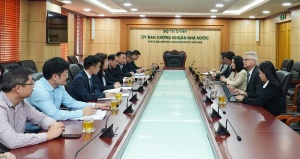Funding change paves way for FTSE upgrade
The enforcement of Circular No.68/2024/TT-BTC has captured the attention of stock market investors. The regulation, effective last week, marks a significant shift by allowing foreign institutional investors to purchase shares without pre-funding and establishes a roadmap for information disclosure in English.
 |
| Funding change paves way for FTSE upgrade, Source: freepik.com |
Specifically, it amends and supplements existing regulations governing securities transactions, clearing and settlement, the operations of securities companies, and market information disclosure.
A standout feature of this circular is the provision that permits foreign institutional investors to buy shares without needing sufficient funds upfront, known as the non pre-funding solution.
“The new rule generally requires investors to have enough funds when placing buy orders, with two exceptions: margin trading as outlined in Article 9 of the circular, and foreign entities investing in the Vietnamese stock market, which are allowed to purchase shares without pre-funding as detailed in Article 9a,” Circular 68 stated.
The addition of Article 9a, covering non pre-funding share purchases by foreign institutional investors, has been met with positive responses from analysts.
Nguyen Trieu Vinh, deputy investment director at Vietcombank Fund Management, noted that implementing Circular 68 could lay the groundwork for Vietnam’s stock market to be upgraded by the Financial Times Stock Exchange (FTSE) in 2025. “The 100 per cent pre-funding requirement has been the most significant barrier for foreign institutional investors, and this change could help overcome that obstacle,” he said.
Likewise, Maybank Investment Bank highlighted that these changes are a step forward, easing pre-funding requirements, managing failed transactions, and ensuring capital adequacy for securities firms.
“We expect that the FTSE could announce an upgrade for Vietnam to emerging market (EM) status as early as March 2025 in an optimistic scenario or by September 2025 under more conservative assumptions. This would set the stage for Vietnamese stocks to be included in the FTSE’s EM indices during 2025-2026,” the securities firm noted.
ACBS Securities analysts further projected that Vietnamese shares could carry a weighting of approximately 0.7-0.9 per cent in the FTSE’s Secondary EM index, attracting around $500-600 million in passive fund inflows, excluding potential capital from active funds.
Meanwhile, Ho Chi Minh Securities Corporation (HSC) observed that foreign institutional investors, now allowed to place non-pre-funding orders, are eager to make use of this new service.
“Although domestic investors and foreign individual investors do not qualify for non-pre-funding under Circular 68, their response has been positive, with expectations that the regulation will encourage more trading activity by foreign institutions and, in turn, enhance market liquidity,” HSC said. “We hope that as the legal framework matures, non-pre-funding privileges will be extended to all investors, enabling them to trade without needing full cash collateral upfront.”
On the other hand, some market experts caution that liquidity from foreign investors may not see an immediate increase, maintaining a share of 8-10 per cent of total daily trading volume. This is because the non-pre-funding mechanism primarily supports settlement processes, while the T+2.5 trading cycle remains in place.
Resolving this regulatory hurdle is also expected to act as a catalyst for reversing the outflow of foreign capital. During the first 10 months of 2024, foreign investors have remained consistent net sellers, with net sales amounting to over $3 billion on the Ho Chi Minh Stock Exchange alone.
| Barry Weisblatt, head of Research VNDirect Securities This move marks a significant shift as it permits foreign institutional investors to purchase stocks without needing pre-funding. This regulation signals the government’s strong commitment to attracting foreign investment into Vietnam’s stock market and is hopefully part of a broader movement to position Vietnam as a prime destination. We foresee two main impacts: the direct effect of the circular itself and the indirect impact of an FTSE upgrade announcement in March. The immediate impact is that active fund managers may increase their allocations to Vietnam due to improved cost efficiency. However, this will mainly pertain to a limited set of global and regional funds that consider Vietnam as part of their broader portfolio. Established funds already fully invested in Vietnam will not alter their allocations, although they might see a slight boost in profitability. The more significant effect will be the indirect one, enhancing the probability of an FTSE EM upgrade announcement in March. Such news could invigorate market sentiment and retail investor interest. Existing exchange-traded funds (ETFs) could witness increased assets under management as overseas retail investors anticipate the upgrade. This could be a notable market event, potentially lifting share prices in Q1 2025. Once the upgrade becomes effective in September and Vietnamese companies are included in EM indices, we expect substantial capital inflows from EM ETFs. While estimates vary, inflows of $500 million to just under $1 billion seem reasonable. Beneficiaries of these developments would likely include companies currently dominating the FTSE Frontier Market index. However, there are risks involved for securities companies. With this regulation, they bear the responsibility for covering settlement defaults by foreign institutional investors, which could impact their proprietary books - a relatively new scenario. While securities firms have conducted e-verification for foreign clients, assessing counterparty risk has not been standard practice. Currently, only a select few securities firms actively cater to foreign institutional clients. To scale up in this sector, firms will need to make significant investments in developing the necessary systems and risk management policies to support this product. |
 | FTSE Russell meeting reveals optimism on Vietnam's stock market upgrade In pursuit of elevating Vietnam's stock market status, officials from the State Securities Commission (SSC) on October 18 engaged in a dialogue with representatives from FTSE Russell, an essential market indices player. |
 | FTSE Russell keeps Vietnam on watch list for emerging market status British analytics and data solution provider FTSE Russell has kept Vietnam on its watch list for possible reclassification to secondary emerging market status. |
What the stars mean:
★ Poor ★ ★ Promising ★★★ Good ★★★★ Very good ★★★★★ Exceptional
Related Contents
Latest News
More News
- Raised ties reaffirm strategic trust (February 20, 2026 | 14:06)
- Sustained growth can translate into income gains (February 19, 2026 | 18:55)
- The vision to maintain a stable monetary policy (February 19, 2026 | 08:50)
- Banking sector faces data governance hurdles in AI transition (February 19, 2026 | 08:00)
- AI leading to shift in banking roles (February 18, 2026 | 19:54)
- Digital banking enters season of transformation (February 16, 2026 | 09:00)
- IFC to grant $150 million loan package for VPBank (February 13, 2026 | 09:00)
- Nam A Bank forms position as strategic member at VIFC through three key partnerships (February 12, 2026 | 16:39)
- Banks bolster risk buffers to safeguard asset quality amid credit expansion (February 12, 2026 | 11:00)
- VNPAY and NAPAS deepen cooperation on digital payments (February 11, 2026 | 18:21)

 Tag:
Tag:



















 Mobile Version
Mobile Version